- Home
- Tim Winton
The Turning Page 2
The Turning Read online
Page 2
At New Norcia we pull in to fuel up and use the phone. Biggie decides that he’s not calling home so he sits in the VW while I reverse the charges and get an earful. My mother wails and cries. I’m vague about my whereabouts and look out at the monastery and church spires and whitewashed walls of the town while she tells me I’m throwing my future away. I hang up and find Biggie talking to a chick with a backpack the size of an elephant saddle. She’s tall and not very beautiful with long, shiny brown hair and big knees. She thinks she’s on the coast road north and she’s mortified to discover otherwise. Biggie explains that this is the inland route, shows her on the map. She wants to get to Exmouth, she says. I can see Biggie falling in love with her moment by moment. My heart sinks.
There isn’t really even much consultation. We just pull out with this chick in the back. Meg is her name. I know it’s hot and she’s had a tough day but she’s on the nose. She’s got a purple tanktop on and every time she lifts an arm there’s a blast of BO that could kill a wildebeest. Biggie doesn’t seem to notice. He’s twisted around in his seat laughing and chatting and pointing and listening while I drive in something close to a sullen silence.
Meg is as thick as a box of hammers. It’s alarming to see how enthralled Biggie is. He goes right ahead and tells her about life in the salmon camp every season when all the huts are full and the tractors are hauling nets up the beach and trucks pull down to the water’s edge to load up for the cannery. All the drinking and fighting, the sharks and the jetboats, the great green masses of fish pressed inside the headlands. He doesn’t tell Meg that it’s all for petfood, that his mother cries every night, that he’s given up defending her, not even urging her to leave now, but nobody could hold that against him. Meg, this mouth-breathing moron, is staring at Biggie like he’s a guru, and I just drive and try to avoid the rear-view mirror.
I get to thinking about the last night of school and the bonfire at Massacre Point, the beginning of that short period of grace when my very limbs tingled with relief and the dread of failure had yet to set in. Someone had a kite in the air and its tail was on fire, looping and spiralling orange and pink against the night sky, so beautiful I almost cried. I was smashed and exhausted; I suppose any little thing would have seemed poignant and beautiful. But I really felt that I’d reached the edge of something. I had a power and a promise I’d never sensed before. The fact that the burning kite consumed its own tail and fluttered down into the sea didn’t really register. I didn’t see it as an omen. Biggie and I drank Bacardi and Coke and watched some lunatic fishing for sharks with a Land Rover. Briony Nevis was there, teeth flashing in the firelight. I was too pissed to go over to her. I fell asleep trying to work up the nerve.
We woke by a huge lake of glowing embers, our sleeping bags damp, the tide out and our heads pounding, but it was the smiling that hurt the most. Biggie wanted to stay a while in that tangle of blankets and swags but I convinced him to get up with me and swim bare-arsed in the cold clear water inside the rocky promontory before we stole back through the sleeping crowd towards my mother’s car. That was a great feeling, tingling, awake, up first, seeing everybody sprawled in hilarious and unlikely pairings and postures. The air was soupy, salty, and as we padded up the sand track with birds in the mint-scented scrub all round, I just couldn’t imagine disappointment. The world felt new, specially made for us. It was only on the drive back to town that our hangovers caught up.
While I’m thinking about all of this Biggie’s gone and climbed over into the back and Meg’s lit up a number and they’re toking away on it with their feet up like I’m some kind of chauffeur. The country is all low and spare now and the further we go the redder it gets. Biggie’s never had much luck with girls. I should be glad for him. But I’m totally pissed off.
In the mirror Biggie has this big wonky grin going. He sits back with his legs stretched out and crossed at the ankles, his Blundstones poking through the gap in the seats at my elbow. Meg murmurs and exclaims at the beauty of the country and Biggie just nods slit-eyed with smoke and anticipation while I boil.
Late in the day, when Biggie and Meg are quizzing each other on the theme tunes to TV sitcoms, we come upon a maze of salt lakes that blaze silver and pearly in the sun and stretch to the horizon in every direction. I begin to have the panicky feeling that the land and this very afternoon might go on forever. Biggie’s really enjoying himself back there and I slowly understand why. There’s the obvious thing of course, the fact that he’s in with a big chance with Meg come nightfall. But something else, the thing that eats at me, is the way he’s enjoying being brighter than her, being a step ahead, feeling somehow senior and secure in himself. It’s me all over. It’s how I am with him and it’s not pretty.
The Kombi fills with smoke again but this time it’s bitter and metallic and I’m halfway to asking them to leave off and open a bloody window when I see the plume trailing us down the highway and I understand that we’re on fire. I pull over into a tottery skid in the gravel at the roadside and jump out to see just how much grey smoke is pouring out of the rear grille. When Biggie and Meg join me we stand there a few moments before it dawns on us that the whole thing could blow at any moment and everything we own is inside. So we fall over each other digging our stuff free, tossing it as far into the samphire edges of the saltpan as we can. Without an extinguisher there’s not much else we can do once we’re standing back out there in the litter of our belongings waiting for the VW to explode. But it just smoulders and hisses a while as the sun sinks behind us. In the end, with the smoke almost gone and the wiring cooked, it’s obvious we’re not going anywhere. We turn our attention to the sunset. Meg rolls another spliff and we share it standing there taking in the vast, shimmering pink lake that suddenly looks full of rippling water. We don’t say anything. The sun flattens itself against the saltpan and disappears. The sky goes all acid blue and there’s just this huge silence. It’s like the world’s stopped.
Right then I can’t imagine an end to the quiet. The horizon fades. Everything looks impossibly far off. In two hours I’ll hear Biggie and Meg in his sleeping bag and she’ll cry out like a bird and become so beautiful, so desirable in the total dark that I’ll begin to cry. In a week Biggie and Meg will blow me off in Broome and I’ll be on the bus south for a second chance at the exams. In a year Biggie will be dead in a mining accident in the Pilbara and I’ll be reading Robert Louis Stevenson at his funeral while his relatives shuffle and mutter with contempt. Meg won’t show. I’ll grow up and have a family of my own and see Briony Nevis, tired and lined in a supermarket queue, and wonder what all the fuss was about. And one night I’ll turn on the TV to discover the fact that Tony Macoli, the little man with the nose that could sniff round corners, is Australia’s richest merchant banker. All of it unimaginable. Right now, standing with Biggie on the salt lake at sunset, each of us still in our southern-boy uniform of boots, jeans and flannel shirt, I don’t care what happens beyond this moment. In the hot northern dusk, the world suddenly gets big around us, so big we just give in and watch.
Abbreviation
IT WAS DARK when the Langs rolled into White Point and nobody had anything to say. They were hours late and everyone knew why but with Nanna in the Jeep nobody was game to say a thing. Vic squirmed in his seat and sighed again, despite himself.
You must have worms, said his grandmother sternly.
I always bring my own bait, he said.
Vic, said his mother with a note of warning.
Sorry, he mumbled.
But he wasn’t sorry. If the others hadn’t kept them waiting half the afternoon they’d be there by now. They’d be set up on the beach with a fire going. It was the usual Uncle Ernie balls-up. When they arrived at his place at noon all Vic’s girl-cousins were packed and ready in the Land Rover out on the hot street, their faces as red as their hair, while their parents were inside having a blue. The Landy’s motor was running, the dinghy was hitched to it with the rods and mattresses and eskies stra
pped aboard in a bristling pile, but Ernie and Cleo were still in the house with the door locked. When Vic’s old man banged on the window, nothing happened. He rattled the door, rang the bell. He got Vic’s cousins out of the vehicle and sat them in the shade. They were the sorriest-looking bunch of girls you’d ever see, freckly as all get-out, with needle teeth and big nostrils. He’d seen carpet sharks prettier than them. Uncle Ernie was a ginger banty-rooster of a bloke and Auntie Cleo let everyone know she was too good for him. She was blonde. She had the looks of an old-timey movie star gone to fat. She had cleavage that damn-near made an echo when she spoke.
Everybody sat out in the street until Vic’s baby sister began to scream in the heat and his grandmother yanked the keys from Ernie’s idling Landy and opened the front door of the house herself. Ernie and Cleo came out pushing and shoving and swearing like sailors and all the wobbegong cousins began to bawl and then Ernie’s Land Rover wouldn’t start because it had overheated chugging out there in the street for God knows how long, and there was more bitching and backbiting while they waited for it to cool, but Nanna wouldn’t hear a word against her favoured son.
So here they were now in the hot night, the Jeep and the Landy winding down the hill to White Point. The streets were empty. They drove on through to where the road ended and the white dunes banked up like a snowfield in the moonlight. Not that Vic had ever seen snow; it’s just how he imagined it going on white forever.
They climbed into the dunes, motors grinding and whinnying. Vic rode the rolls and jerks and tried not to think about food. When the going was smooth the rumble of the diffs lulled him close to sleep and several times he stirred to see that Uncle Ernie was bogged to the axles and Vic had to get out with his father and grandmother to dig or set a tow rope.
It’s the boat he’s pulling, said Nanna, in defence of Ernie’s driving. It’s the load and all those kids.
Vic’s mother pressed her lips together in the bright moonlight and nursed his baby sister. She knew as well as Vic that Ernie was careless, that he approached every hill in top gear, that his tyres were pumped too hard.
Nanna directed vehicle recovery. She rode out on the side step and talked through the open window, barking the kind of instructions that only a non-driver could give. After a long time they came into saltbush country and down into firm tracks that were steady going. The red eyes of the boat trailer up ahead mesmerized Vic until he slept again. When he woke they were down on wide, white beach that was as hard as a highway. For miles they drove fast and easy until they came to a spit where several campfires burned already.
Vic put up poles and ropes and tarps with the rest of them and ate cold roast lamb and potatoes in a stupor of fatigue. He fell onto a mattress and wound himself in a sheet and slept with the surf roaring all around him. He woke in the night, certain the sea had overrun them, but it was only the cool breeze rolling over him in waves and he slept on dreamless.
At first light the wind off the land was already hot and it smelt of saltbush and desert. When Vic woke, his grandmother was frying eggs over a driftwood fire. His father and uncle had the dinghy at the water’s edge and were loading it with big cane craypots. Vic sat at the trestle table beneath the billowing tarp and ate eggs and drank tea from an enamel cup. The girls were only just stirring now and the other women were still asleep. The men came and ate breakfast and when they were finished Vic helped them push the boat into the shorebreak and jumped in when the outboard fired.
Ernie throttled them out into calm water and Vic looked back at the other cluster of tents and tarps not far from their own camp. He saw a truck and a tractor and a striped tent big as a circus marquee. The sun was low on the rolling dunes and he felt tired and strangely old. Today was the last day of the year. He wished there’d been room for a mate on this trip, someone to see 1973 in with, but the only spare seat had gone to Nanna; these days there was no escaping her. And now that the wind was rifling through his hair and the aluminium hull thrummed underfoot, he began to wish that it was his father at the tiller and not his uncle, because Ernie steered a boat as nonchalantly as he drove. The more confident Ernie was the less cause there was for anyone else to feel safe. But it was Ernie’s boat not his father’s. They didn’t have a boat, couldn’t afford one. Vic smiled gamely at the old man, reading the amusement in his raised eyebrows, and held on as they pounded out towards the reef. Beneath him the water flashed by, white, green, blue, yellow. When they got out over the mottled deep, swells rolled in smooth and oily while Vic’s old man baited the pots with beef hocks and Ernie uncoiled ropes and floats. They tipped the craypots into sandy green holes and left the ropes snaking on the surface.
Back on the beach the carrot-top cousins squealed for a ride in the boat.
While they were tootled around the shallows Vic went up to the makeshift shelter between vehicles and saw that his mother was up. He rocked his baby sister while his mum ate breakfast and listened to Auntie Cleo talk about fingernails and cuticles. Vic’s Auntie wasn’t really a Cleo; she botted the name from the magazine with the horoscopes and male centrefolds. Her real name was Cloris. She bored his mum stupid. Vic’s mum did her best to hide it from him but he knew it well enough. She must have been tired this morning because at one moment during Cleo’s prattling monologue, at the very instant that Nanna happened to look their way, she rolled her eyes at him as if to say give me strength. Cleo didn’t notice but Nanna’s mouth was like a knife edge.
Vic didn’t know why they were all stuck on this trip together but there was no doubt it was Nanna’s idea. She had firm ideas about family, and when she was around everybody else’s ideas went soft.
He wasn’t quite thirteen but Vic knew a thing or two about Uncle Ernie. The oldies kept it quiet but he knew that with Nanna Ernie had protected status. It was as though he could do no wrong. Yet everything Ernie touched turned bad. He liked the nags. He played two-up and always knew a bloke who knew a bloke who had something or other on the highest authority. He was, therefore, always in trouble. It wasn’t unusual to have men come knocking on the door for him as though Vic’s old man was his father and not just his brother. Less than a year ago, just after his sister was born, Vic and his dad had to take Ernie’s truck out in the wee hours to deliver milk for him. Nobody said where Ernie was. Nanna came along of course. She read out the orders by the light of a policeman’s torch, and Vic ran until his throat was raw. The streets were dark and still. His father drove and ran and hardly said a word all night. Vic sensed that there’d been other nights he was spared. Now the milk round was gone in any case.
Vic was always uneasy around his uncle. Ernie was funny. There was always a joke on the boil, something to be kept from the women, but you’d never tell him anything important about yourself. He was always talking, never listening. One Christmas, when Vic was eight, Uncle Ernie arrived out of the blue with a brand new bike for him, a Stingray with a T-bar shift. It was redder than Ernie’s face and seemed to please his uncle as much as him but Vic’s parents were strangely subdued. As an eight-year-old he had wondered if it was too much, too big a gift. He suspected they were jealous or even ashamed of their own thrift. Now he suspected that the bike was hot. There’d never been any gifts since.
Ernie, Vic realized, was a live wire, an adventurer. That was his role in the family. Vic’s father, on the other hand, was the one who tidied up after the excitement. You could see they’d been doing it all their lives.
Ernie and Cleo think they’re irresistible, he overheard his mother say one Easter.
So, said his father, who gets to break the news to them?
Vic sat around with the others as long as he could stand it but when it grew hot even beneath the shade of the tarps he unstrapped his surfboard from the roof of the Jeep and struck off down the beach. He walked until their camp was just a solitary blot in the white distance.
The waves were only small but he wasn’t much of a surfer yet so he didn’t mind. After the hot walk the water was delicious
. He paddled out excitedly and caught a few waves but either nosedived or tripped over himself. He even fell off trying to sit on the thing out beyond the break; it was like riding a greased pig. But you had to laugh at yourself. With mile after mile of deserted beach stretching out behind you there was nothing to be embarrassed about. He could have surfed in the nude if he wanted. Out in the calm he dived to the bottom and saw the ripples of the sandy seabed stretching out forever. The water travelled over his skin like a breeze. He felt free and happy.
When he surfaced he was startled to realize that someone was watching him. Up on the crest of the first dune somebody sat with their arms across their knees. He couldn’t make out if it was a man or woman, boy or girl, and he hung in the water, holding his board, waiting for them to move off, but whoever it was stayed put. Vic grew a little nervous. He supposed he could lie here all day if need be; he could maybe paddle out if he felt really threatened but he didn’t get the chance because a big set came through while he had his back to the sea. The first wave sent him bum over breakfast onto the sandbar and snatched the board from his grasp, and the four monsters that followed slammed him, tumbling, along the bottom, holding him down so long that when he finally surfaced, with his shorts halfway down his legs, he gave out a pathetic squeak more embarrassing than the fact of his bare arse. He dragged up his shorts and stumbled, coughing, along the shore to where his board lay washed up.
Over on the dune the stranger clapped. It was a girl and not one of his cousins. He wanted to snatch up the board and walk back to camp then and there but he was winded and weak at the knees, so he sat on the thing with his back to the girl and did his best to ignore her. Bitch. But he felt so stupid with his head sunk between his shoulders out in the middle of an empty beach like this. He was like a turtle trying to pull its head back into its shell. He hunched over, fuming. A stream of water gushed from his nose.

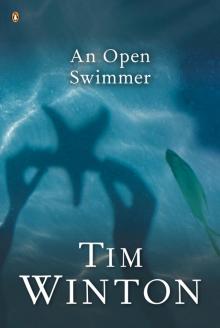 An Open Swimmer
An Open Swimmer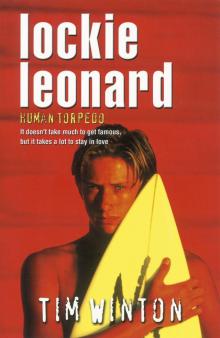 Human Torpedo
Human Torpedo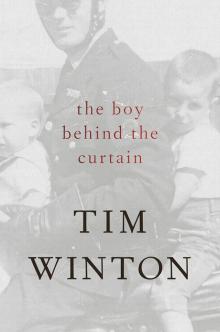 The Boy Behind the Curtain
The Boy Behind the Curtain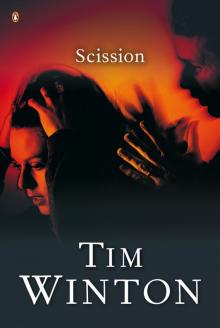 Scission
Scission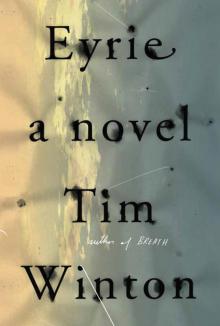 Eyrie
Eyrie Island Home
Island Home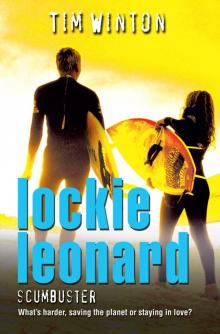 Scumbuster
Scumbuster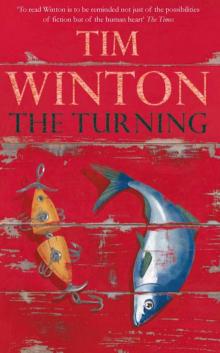 The Turning
The Turning Legend
Legend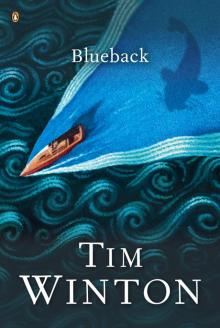 Blueback
Blueback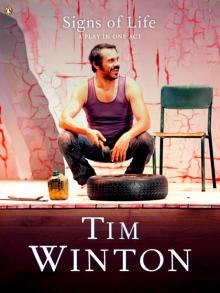 Signs of Life
Signs of Life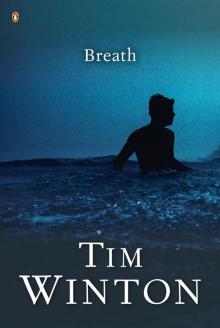 Breath
Breath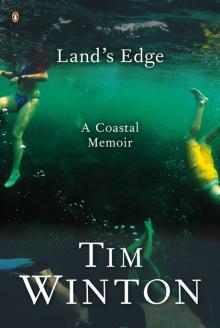 Land's Edge
Land's Edge Cloudstreet
Cloudstreet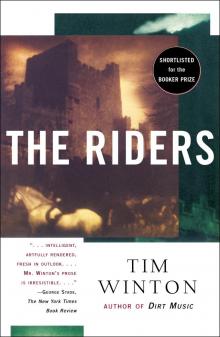 The Riders
The Riders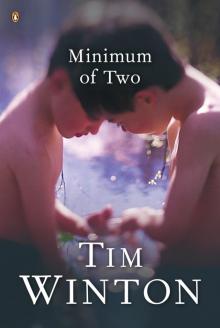 Minimum of Two
Minimum of Two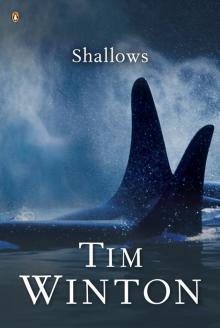 Shallows
Shallows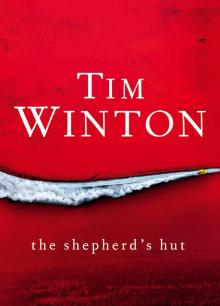 The Shepherd's Hut
The Shepherd's Hut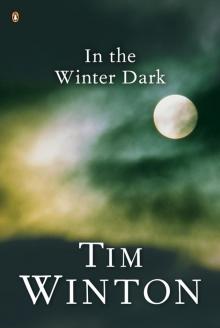 In the Winter Dark
In the Winter Dark